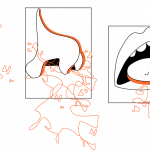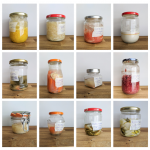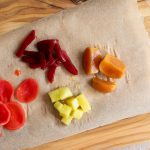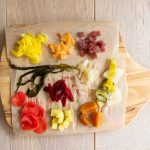Roxana Macovei
- Faculty of Design
- Interaction Design
- ma
- Negotiating with Food: Setting the Table for Mindful Bodies and Non-Objects
- Tutor(s): Liis Tuulberg

All things tell a story.
And this story departs from the idea that our societies are organized primarily around narrow understandings of food: abundant, aesthetically perfect, and available all year round – indeed, this is a convenient story, but is it a real one?
In its essence, this is not just about food, but about the practice of design more broadly. As I explore the relationships between humans and food, I also discuss the relationship between humans and (designed) things. And I argue against the logic of form popularized by human-centered design: that of casting (designed) artifacts as objects, and removing friction between them and their users. I propose that meaningful relationships stem not from the absence, but from the balance of friction between humans and things.
So, be warned, this is not going to be a story of how I produce a solution, but rather how I develop new understanding about design.
To uncover new ways of relating to food, I work against the idea of food as static. And to do so, I use the practice of fermentation as a tool; to expose how much transformation food can take; to expose how much more involved we can be in these transformations; to expose how much plurality one can find in the most mundane things. In the end, I propose that through intimate engagement with food, fermentation becomes spacious – a liminal space, what I call the space in between.

And, I learn that to tell the story of spaces in between, I need new actors. Here is where I employ the notions of non-objects, mindful bodies, and negotiation. It is an attempt to forward the idea that the fermentor and ferment are in constant negotiation, where the mindful body (fermentor) and non-object (fermented food) are mutually affecting their being-in-the-world. This closer look at the agency of food reveals something about our own agency as well – both are codependent and ever emergent from friction.
Like this, maybe it’s not too crazy to propose food and design artifacts to be just one thing in space and time. They shouldn’t work as definitive badges, but more like temporary states – just like hungry or tired. Because it is in these spaces in between that I find opportunities to actively engage with things, via intervention and improvisation. Precisely how, through fermentation, I discover abundance inside humble ingredients. Thus, what results from this negotiation is a story of both food and me, a story that honors the identity of both of us.


